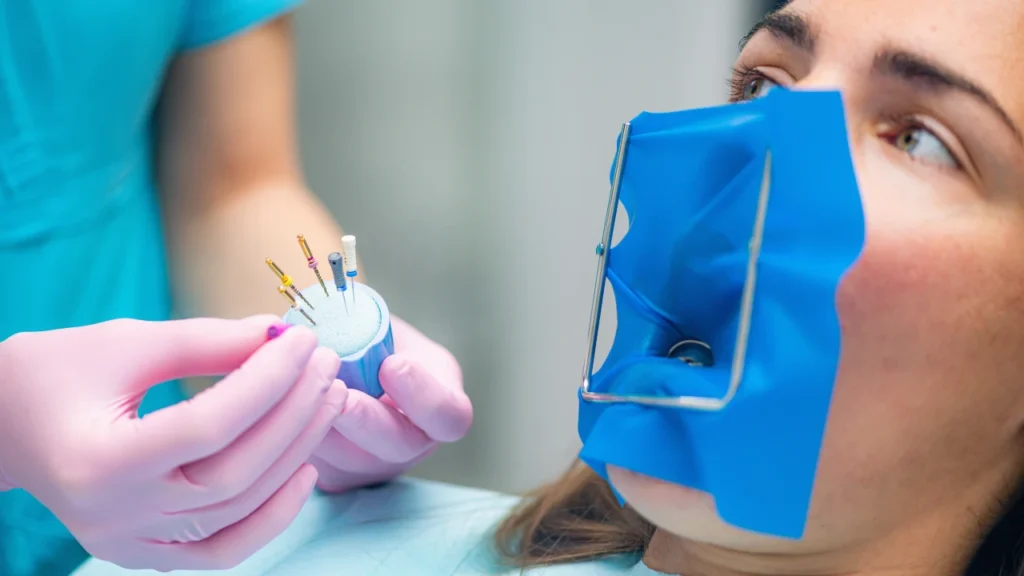Let’s save your tooth
Endodontics in Medellín
Endodontics is the branch of dentistry that focuses on diagnosing and treating diseases of the dental pulp, also known as the “nerve of the tooth.” The dental pulp is a soft tissue located inside the tooth that contains blood vessels and nerves.
In Medellín, there are different options for undergoing an endodontic treatment. However, it is important to choose an experienced professional and use high-quality materials to achieve optimal results and avoid complications.
At the office of Dr. Carolina Bermúdez we have professionals with extensive experience in endodontics. She offers her patients different treatment options so they can save their teeth and avoid extraction.
We use the latest advances in technology and the highest quality materials to ensure optimal and safe results.

What is endodontics?
Endodontics is a treatment performed to save a tooth that has been affected by an infection or deep cavity. The infection or cavity can reach the dental pulp and cause pain, inflammation, or even death of the tissue.
How is a root canal performed?
Endodontics is performed in one or two appointments, depending on the complexity of the case. In general, the procedure is carried out as follows:

When is a root canal necessary?
In general, a root canal is necessary when the dental pulp is inflamed or infected. This can occur due to the following causes:
Deep cavity:
- This is the most common cause of a root canal.
- An untreated cavity can progress and reach the dental pulp.
- The cavity causes demineralization of the enamel and dentin, the hard tissues of the tooth, which are eventually destroyed creating a hole.
- If left untreated, the infection can reach the dental pulp and cause pain, inflammation, or even tooth death.
Dental trauma:
- A blow or fall can damage the dental pulp and cause inflammation or infection.
- Dental trauma can vary in severity, from a simple enamel fracture to complete tooth avulsion.
- In some cases, dental trauma can cause pulp necrosis, making a root canal necessary.
Tooth fracture:
- A tooth fracture can reach the dental pulp and cause an infection.
- Tooth fractures can be caused by trauma, bruxism (teeth grinding), or cavities.
- If the fracture affects the dental pulp, a root canal is necessary to save the tooth.
Tooth wear:
- Tooth wear can reach the dental pulp and cause inflammation or infection.
- Tooth wear can be caused by bruxism (teeth grinding), acid erosion, or poor oral hygiene.
- If tooth wear affects the dental pulp, a root canal is necessary to save the tooth.
Allergic reaction to a dental material:
- In some cases, a dental material such as an amalgam or crown can cause an allergic reaction in the dental pulp.
- This allergic reaction can cause inflammation and infection of the pulp, making a root canal necessary.
Extreme tooth sensitivity:
- In some cases, tooth sensitivity may indicate that the pulp is inflamed or infected.
- If the sensitivity is extreme and does not respond to topical treatments, a root canal may be necessary.
It’s important to note that not all cases of tooth pain require a root canal. In some cases, the pain may be caused by a superficial cavity, periodontal disease, or a bite problem.
The results of Botox are visible instantly and last between 4 and 6 months.
It is important to note that Botox is not a permanent treatment for expression lines. Regular treatment is required to maintain the results.

Why choose Dr. Carolina Bermúdez for your root canal treatment?
At Dr. Carolina Bermúdez’s office, a team of professionals experienced in endodontics performs this type of treatment with maximum precision using the latest advances in technology and the highest quality materials.
Frequently asked questions
A root canal usually takes between one and two hours, depending on the complexity of the case.
The cost of a root canal in Medellín varies depending on several factors, among which are:
- The complexity of the case: A tooth with a single root canal generally costs less than a tooth with multiple canals.
- The type of treatment: Single-root, two-root, or multi-root endodontics have different prices.
- The experience of the dentist: Dentists with more experience and prestige usually charge higher fees.
- The location of the clinic: Clinics located in more exclusive areas of the city may have higher prices.
- Swelling: Swelling at the injection site that usually disappears within a few days.
- Redness: Redness at the injection site that usually disappears within a few hours.
- Pain: Mild discomfort at the injection site that usually disappears within a few hours.
In very rare cases, allergic reactions may occur.
A dental crown is a cap placed over a tooth to restore it and protect it from future fractures.
The root canal is the space occupied by the dental pulp inside the tooth.
General recommendations:
- Rest: Avoid chewing hard or sticky foods with the treated tooth during the first few days. Opt for a soft and easy-to-digest diet.
- Ice: Apply cold compresses on the cheek on the treated side for 20 minutes several times a day to reduce inflammation.
- Medications: Take the painkillers and anti-inflammatories prescribed by your dentist as directed.
- Oral hygiene: Brush your teeth gently twice a day and use dental floss once a day. Rinse your mouth with warm salt water after meals.
- Avoid smoking: Smoking can slow healing and increase the risk of complications.
- Follow-up visits: Attend your follow-up appointments with your dentist to ensure proper recovery progress.
Specific care:
- Sensitivity: It is normal to feel sensitivity in the treated tooth during the first days or weeks. This sensitivity should decrease over time. If discomfort is intense or persistent, consult your dentist.
- Pain: If you experience intense or throbbing pain after a few days, it could be a sign of infection. Contact your dentist immediately.
- Inflammation: If inflammation in the cheek persists or worsens after a few days, consult your dentist.
- Fracture: If you notice any fracture or crack in the treated tooth, it is important to consult your dentist as soon as possible.
Root canal treatment is usually not painful, as it is performed under local anesthesia. However, you may experience some mild discomfort after the procedure, which can be managed with over-the-counter pain relievers.
The idea that root canals or endodontic treatments cause cancer is a myth that has circulated for years without any scientific basis.
Various investigations and studies conducted by experts in dentistry and oncology have confirmed that there is no causal relationship between root canals and the development of cancer.
Unfounded fears about this topic may stem from confusion with other conditions. For example, some cases of facial pain or inflammation in the mouth after a root canal may be misinterpreted as symptoms of cancer, when in reality they are due to other causes such as normal tissue healing or mild infection.
It is important to highlight that root canal treatment is a safe and effective procedure to save teeth damaged by deep cavities or infections.
If you are concerned about your health, always consult a qualified dentist or healthcare professional for accurate, evidence-based information.
